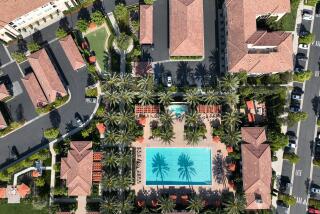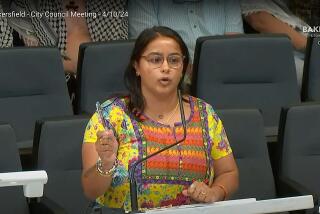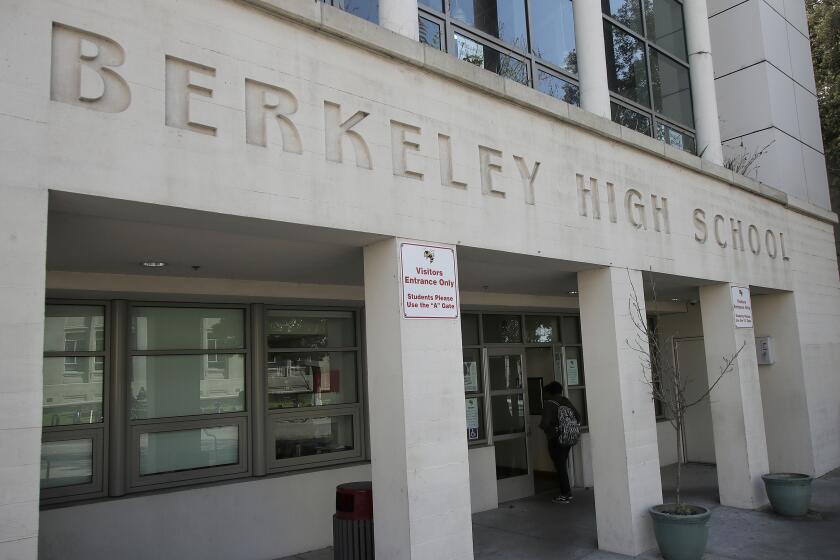DWP Seeks 18% Hike in Water Charges
The city Department of Water and Power proposed Monday to increase water bills 18% over the next two years, citing the need to better secure Los Angeles’ extensive water system against terrorism and to meet water-quality standards.
The increase, which would boost the bill for the average homeowner by $4.15 per month, won a quick endorsement Monday from Mayor James K. Hahn but immediately drew skepticism and some opposition from the City Council, which would have to ratify it.
Without the surcharges, the DWP would not be able to cover all of its increasing costs and could face a downgrading of its bond rating and a greater cost to borrow money, said David Wiggs Jr., general manager of the agency.
“It will put in jeopardy our ability to secure our water and maintain the high quality of our water,” Wiggs said.
The new “security surcharge” and an increase in the current water-quality surcharge would provide $89 million over the next two years, the department said. The money would go toward meeting clean-water standards and safeguarding 7,100 miles of water pipes, as well as water tanks and reservoirs.
Hahn said the increased demands for security after the Sept. 11, 2001, terrorist attacks on the East Coast and stricter water-quality standards justify the surcharges.
“I support the steps the L.A. DWP has recommended to ensure the reliability that has been the hallmark of our water system for more than 100 years,” Hahn said.
However, some City Council members, who are expected to vote on the surcharges in January, voiced doubts.
“I could never support anything like that as long as the DWP keeps giving its employees raises higher than what the rest of the city workers get,” said Councilman Greig Smith.
Smith was skeptical that the DWP is short of cash, noting that the agency’s board is scheduled today to approve $175,000 for the design and construction of a city float in the upcoming Tournament of Roses Parade.
City Councilwoman Cindy Miscikowski, a member of the council committee that will consider the surcharges, said they would be closely scrutinized.
“We really need to look at this and determine how much of this is the cost of doing business and how much is not,” Miscikowski said. She added that 18% “seems awfully high, but I’ve gotten calls from people who are concerned about our reservoirs and their openness and security.”
Wiggs said an agency security study identified $135 million needed during the next five years for security improvements, including the construction of a central security dispatch center, the installation of cameras at reservoirs and aqueducts and the purchase of two new helicopters to patrol them.
The study also identified another $20 million in annual operation and maintenance costs, many of which are already in place, that have included a doubling of the DWP security force to about 120 officers. The agency also needs revenue from the surcharges to help build a new facility to increase testing of water for pollutants and poisons, Wiggs said.
In addition, the Safe Drinking Water Act and other federal laws are forcing the DWP to either cover or bypass open reservoirs. This year alone, the agency borrowed $300 million to address the increasingly stringent water-quality rules, Wiggs said.
The surcharge would take effect in two stages -- an 11% increase in January or March, followed by a 7% hike in 2005.
The city has not increased its water surcharges since 1992, and Wiggs said that even if the new level is approved, Los Angeles’ water rates still would be competitive with those in other major cities, according to a comparison conducted by the DWP.
He noted that San Francisco voters approved a bond measure that called for a 183% increase in water rates by 2015, while San Diego is raising rates 35% over five years and Pasadena has approved increases in its bills up to 37% over an 18-month period.
“Comparatively speaking, other jurisdictions have gone up more,” said Councilman Ed Reyes. Reyes said he is concerned about putting an unreasonable financial burden on poor families, but also sympathetic to the need to boost security.
Addressing council members’ concern that the surcharges might be used for general operating expenses such as pay raises, Wiggs said the proposed ordinance would earmark the new revenue specifically for security and water quality.
The notice being sent out to major business and government customers assures them that the decision to charge more “is not one that is taken lightly,” adding: “It is the only course of action that will ensure both the security of our water system and its financial viability.”
More to Read
Start your day right
Sign up for Essential California for news, features and recommendations from the L.A. Times and beyond in your inbox six days a week.
You may occasionally receive promotional content from the Los Angeles Times.







